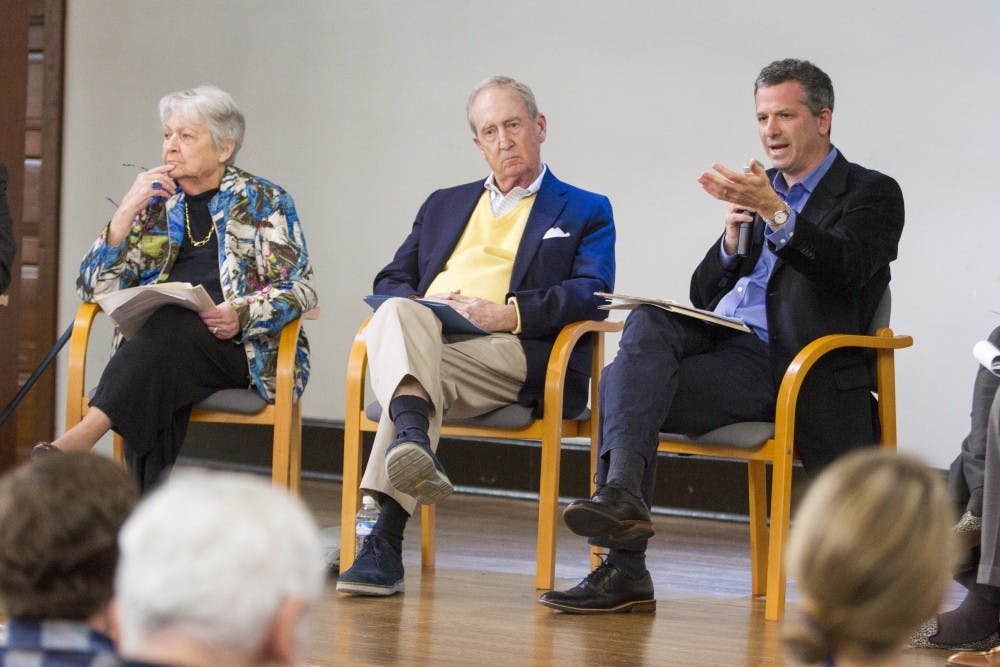Panelists and citizens came together at the Jefferson School African American Heritage Center for a public forum Sunday on the future of Charlottesville governance. The panel — titled “How might Charlottesville be governed differently in the future?” — was the second of two public forums scheduled for February to address community concerns about governance in the city.
Following the events of last summer, when white nationalist marched on the Lawn Aug. 11 and held the deadly Unite the Right rally in downtown Charlottesville Aug. 12, many citizens have raised concerns over the accountability of local government officials.
The first session, held earlier this month, explored the current format of Charlottesville governance. These panels were organized by Charlottesville Tomorrow and the League of Women Voters in response to citizens asking for informational programs about the form and function of local government in Charlottesville.
Charlottesville currently operates under the council-manager form of government. The City Manager is appointed by the City Council and acts as the chief administrative officer for the city. The city manager is responsible for executing the decisions and policies of the City Council and works with various Charlottesville departments to implement those decisions.
The panel was comprised of former Richmond City Councillor Bill Pantele, former Charlottesville City Councillor George Gilliam, former Lynchburg City Councillor Joan MacCallum and University Law Prof. Rich Schragger.
Andrea Douglas, executive director of the Jefferson School African American Heritage Center, and Bob Gibson, communications director of the Weldon Cooper Center for Public Service, moderated the panel.
“The community in this place has always been involved in conversations that have directed, that have helped Charlottesville understand its relationship to its civic duty,” Douglas said. “And so having this conversation here today as we’re considering options feels very right.”
Despite the potential changes that can be made to the form of government, Pantele addressed how a lot of the style of governance is dependent upon those elected to public office.
“At the end of the day the form of government may not save you,” Pantele said. “It’s going to be by the quality of the people you have in office on City Council, who your mayor is, who your city manager is, do they have values and the connection to the people.”
One of the introductory topics was the disconnect between federal, state and local government in regards to power and accountability.
“In our three-tier system of government, there’s a tendency to push responsibilities down to the localities, but not give sufficient resources for the localities to take care of those responsibilities,” Schragger said. “And that’s a feature of a politics in which the [state officials] don’t have a lot incentive to take responsibility for local circumstance.”
MacCallum described a ward-based election system, in which an electoral area is divided into sub-areas or wards, with representative voices for each “ward” in question. Currently in Charlottesville, residents are represented by members of City Council who are popularly elected and represent the city at large. MacCallum addressed how wards can result in more appropriate diversity for government representation, especially when there might be underrepresented, predominantly black areas.
Gilliam introduced potential options available for pursuing a new form of governance in Charlottesville including directly electing the city mayor — as opposed to the current process where the mayor is selected from City Council by other members of the Council — or increasing the size of the City Council.
Gilliam also suggested that Charlottesville revert from a city to a town status where it would become a part of Albemarle County and would operate as a single governing unit. However, this transition is unlikely to take place as Virginia state code does not permit cities with populations greater than 50,000 inhabitants to renounce their city status. The current population of Charlottesville is just under 50,000 individuals and will likely surpass the limit within a few years.
In addressing how to confront problems in government, Gilliam emphasized the importance of clearly articulating issues in order for them to be effectively addressed in policy.
“People have said, ‘Well, I want greater transparency and I want greater accountability’... those are pretty vague terms,” Gilliam said. “I think that if we need to do something, we need to be clear exactly what it is we hope to accomplish.”
During the question and answer period, one issue of discussion was the potential for incompetence or irresponsibility on the part of Council members and city officials. Some questions addressed how the salary of $14,000 per year, in combination with the high level of work and responsibility, might not attract the best candidates to the role of city councillor. Others touched on the lack of training and expertise required of city officials, the low budgets for Council staff and aid and the constant risk of inefficient flows of information in government.
Gilliam commented on how he thinks this disconnect of responsibility and knowledge displayed itself on Aug. 11 and 12.
“On the part of people who should have known better, they did not understand what their responsibilities were,” Gilliam said. “One thing that we’ve got to make certain is that … everyone understands what their particular role is.”
Although the issues discussed were complex and panelists and audience members were not always in agreement, there was still an emphasis on collaborative discourse.
“I think it’s great that we, as a community, can come together and think about these things at a pretty high level of discourse,” Schragger said. “That’s important because to me, and I think to all of you in the room, local government is where the action is at.”







